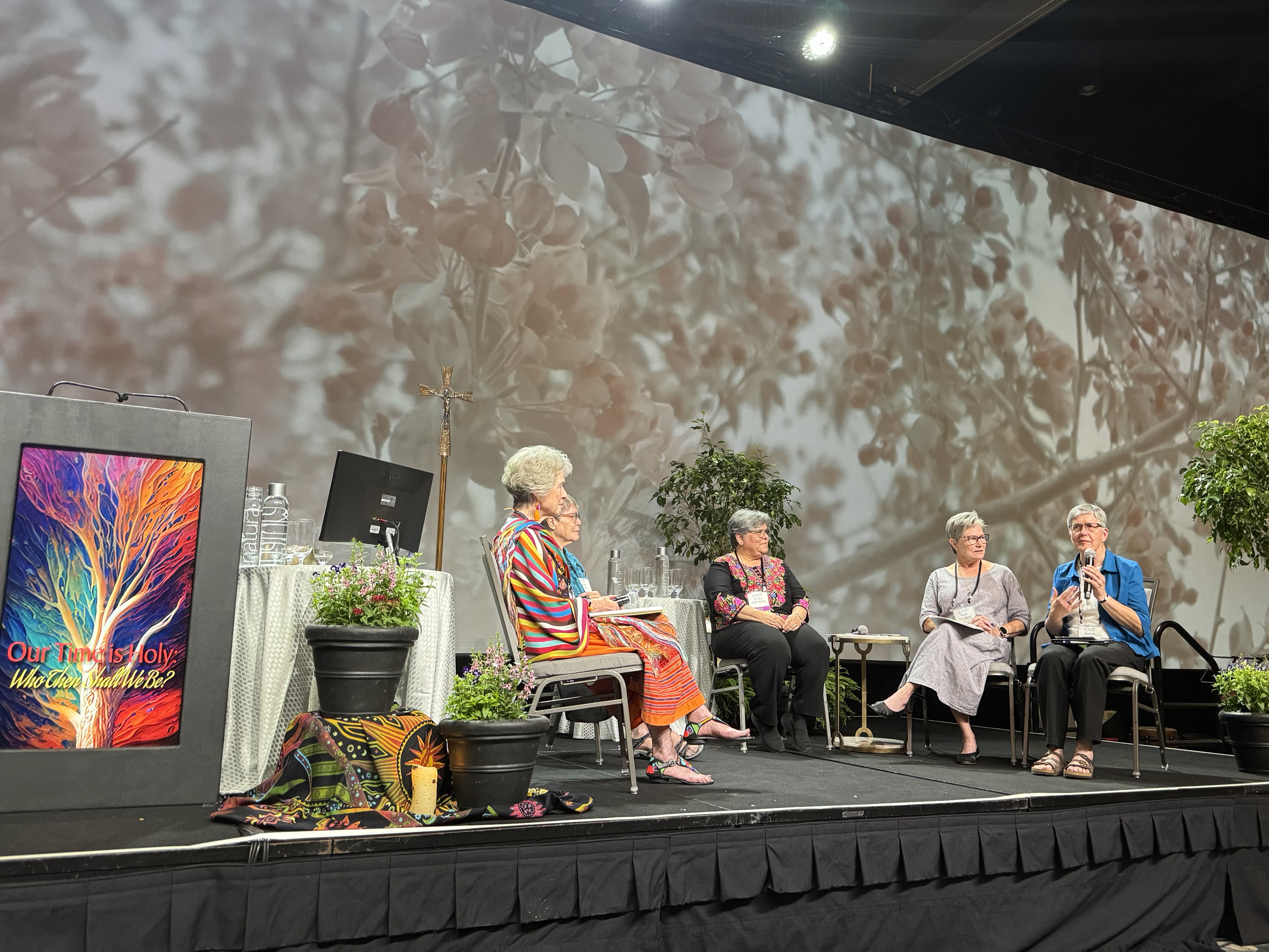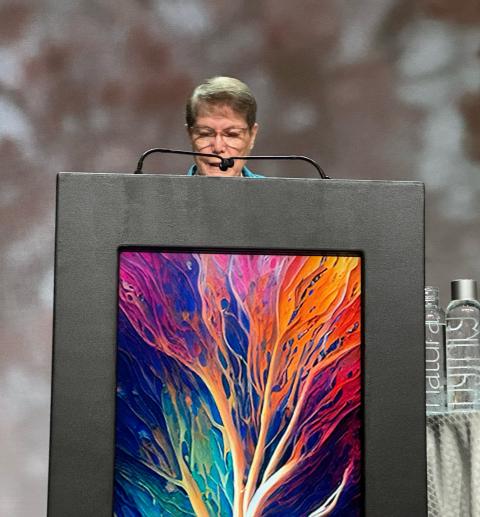
Sr. Patricia Henry, second from left, joins LCWR members who are offering reflective responses to the keynote address she delivered on behalf of fellow Benedictine Sr. Maricarmen Bracamontes, Aug. 15. (GSR photo/Helga Leija)
Dominican Sr. Maureen Geary delivered the presidential address to the Leadership Conference of Women Religious at the 2024 annual assembly in Orlando, Florida, Aug. 14, themed "Our Time is Holy: Who Then Shall We Be?" Using creative imagery, song and poetry to illustrate how every moment is sacred, Geary encouraged us to reflect on our identity and mission as sisters, emphasizing that finding out who we are meant to be is a continuous process, not a simple answer. She urged us to explore deeply and be ready to meet the changing needs of the world and the challenges and opportunities facing consecrated religious life today.
In the second part of her talk, Geary discussed the connection between time and horizon. She quoted Holy Cross Sr. Sharlet Wagner, a former LCWR president, who asked, "Do we believe that our congregations are exactly where God wants them to be at this time?" Geary then spoke about the investment of ourselves and our goal of contributing to the life of the world. She announced that LCWR will soon focus on "living into our emerging future." She noted that for many years in consecrated life, we have emphasized that our life is not just about doing but about being. While I agree with Geary, I must admit that this is easier said than done: ministry and the needs around us move us, and compassion drives us.
This challenge of balancing action with "being" naturally leads to a profound question: What do we do when we have given everything and find that we have nothing left to give? This is a particularly difficult reality for sisters, as there are less of us to complete the tasks that used to be done by many. How do I navigate this balance in my own life, especially when the labora exceeds the ora?
Reflecting on this, I appreciated Sister of Charity of Leavenworth Melissa Camardo's response to the presidential address. She spoke about the importance of being "all in" with our vows and being fully committed to this life, with love and passion for consecrated life today. Like her, I sometimes wonder if we truly believe in our future, especially when I see so many preparing for the end and not even allowing a small crack for the light of life to enter. To paraphrase Geary, when we become experts at letting go but do not know how to "let come," have we forgotten how to welcome and nurture new life?
Camardo suggested that to believe in our future, we must first believe in our present. Our present is unfolding, and that is the beauty of our life — it is always evolving, never static. I appreciated Geary quoting Sr. Thea Bowman, a Franciscan Sister of Perpetual Adoration, highlighting that God is using us in ways beyond our comprehension, demonstrating openness to both God and our community.
In addition to personal commitment, Camardo also emphasized the need for greater openness and trust among us to foster our ability to share with one another, which leads to greater freedom, healing, and communion as we move towards our emerging future. This resonates with the wisdom of St. Benedict in our Rule, that we journey together towards everlasting life.
Advertisement
The following day, Benedictine Sr. Maricarmen Bracamontes delivered the keynote address through the voice of her community member, Sr. Patricia Henry. Her keynote explored the concept of Christian hospitality, emphasizing its radical and unconditional nature, which reflects the style of Jesus. She addressed the challenges and opportunities for communities, particularly religious ones, living out this hospitality in today's world.
As a translator, I loved the reference to the translation of the French word hôte, which names both the one who is welcomed (the guest) and the one who is welcoming (the hostess) — which makes sense when she then says that hospitality requires vulnerability, because "it involves a risk on both sides." This is something I have experienced as a transfer sister to a new community. There is a vulnerability in the community who opened the doors of their hearts and house to me, and a vulnerability in me, in being welcome. We both risked vulnerability, but had we not tried, I would not have gained a new religious family, and they would not have gained a new member.
"When we become experts at letting go but do not know how to 'let come,' have we forgotten how to welcome and nurture new life?"
Further expanding on this idea, Bracamontes also spoke of radical inclusion as a process of conversion that allows us to progressively move from hostis to hospes: from a perception of the other as a threat, to their revelation as a gift. In other words, moving from hostility to hospitality. Illustrating the impact of radical hospitality, Bracamontes highlighted the transformation that occurs within individuals and communities when they engage in this practice, especially towards those who are marginalized or suffering.

Benedictine Sr. Pat Henry lends her voice to Sr. Maricarmen Bracamontes to deliver the keynote address to the LCWR assembly Aug.15. (GSR photo/Helga Leija)
She spoke of women who experience healing and empowerment through their inclusion in community life, demonstrating the real-life impact of hospitality but also how community members experience the same healing, growth, and deeper spiritual awareness through the practice of radical hospitality.
Bracamontes' talk also honed on the ethical responsibility to respond to human suffering and the call for inclusivity in the Christian faith, which Geary echoed in her presidential address: "Our eagerness to respond reveals the vibrancy of our becoming. Each time we respond 'send me, send us,' new depth emerges in the portrait of who we shall be."
Bringing together these themes of response and transformation, Missionary of the Holy Spirit Fr. Jose Luis Loyola reminded us during the Aug. 15 Mass.
"At this moment, the religious of the continent, united with all the People of God and many brothers and sisters who are deeply concerned for your people, are offering our stumbling and imperfect efforts," said Loyola, an LCWR guest from the Confederation of Latin American Religious. "With hope and despair, indignation and tenderness, we are fulfilling our role as sentinels of the breath of the Gospel. Guided by the Spirit, we continue to weave the yearning for change, for the ordinary, for meaningful encounters, and for the unknown, as we navigate towards a new shore beyond the bounds of custom and tradition."
As we move into our emergent future, we are invited to embrace the sacredness of each moment, being "all in" to our vowed life and practicing radical hospitality. We journey together, to everlasting life. Todos juntos hacia el reino.







